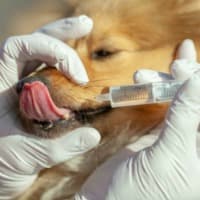Puppy Worms Guide
There are four types of intestinal puppy worms that your little Rascal is most at risk of contracting:
Then there are Heartworms which, as their name suggests, actually affect the heart rather than the digestive system.
And similarly, Lungworms, which affect a puppy's lungs.
The four intestinal worms are the ones you're most likely to be dealing with if you have a young puppy and of those four, roundworms are the most common.
While a severe worm infestation can cause very serious health issues (and could potentially be deadly for a puppy), the diagnosis and treatment of puppy worms is simple and effective.
Most veterinarians routinely screen for worms at your puppy's health check appointments.
Puppy Worms - Roundworms
You may be wondering why roundworms (also called Nematodes) are so common in puppies, and what causes them.
And, you might find the answer to these questions surprising because most new puppy owners don't realize that many, many puppies are actually BORN with roundworms.
This happens because roundworm larvae can be transmitted across the placenta to the puppy while he's in his mothers uterus.
Little Rascal can also get roundworm larvae from his momma's milk when nursing.
The momma dog doesn't have to be showing signs of an active roundworm problem in order to pass on roundworm larvae because they can lay dormant in her body and activate during pregnancy.
Puppies, and dogs, can also get roundworms from eating soil, plants, other dog/animal feces, or dead animals/insects.
Roundworms are, as you'd expect, round. They can also be up to 6" in length, and generally resemble thin strands of spaghetti, or noodles.
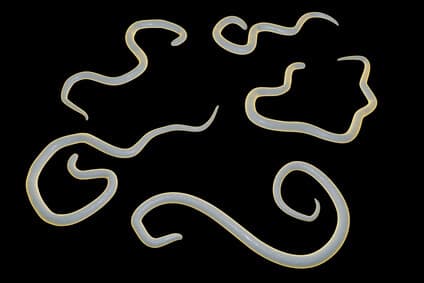
When roundworms are expelled from your puppy's digestive system in his poop or vomit they may be intact adult worms, they may be tiny immature worms, or they may be broken up into smaller pieces.
Whatever length they are you won't have much trouble in identifying them as roundworms are fairly easy to see with the naked eye.
How do I know if my puppy has roundworms?
Unless you actually SEE the roundworms in your puppy's poop, or vomit, you can't be sure that he has them, but there are a few things to look out for which might mean puppy roundworms have set up shop in his little body.
Common signs of roundworms in puppies include:
- Reduced growth rate or weight loss
- Increased appetite or a puppy who is never 'full'
- Enlarged, rounded 'potbelly' that isn't in proportion with his limbs/ribcage etc.
- Poor coat condition
- Diarrhea (which may contain worms and/or blood/mucus)
- Vomiting (which may contain worms)
- Itchy rear end (Rascal may drag his bottom across the ground)
- Periodic coughing or gagging
- Lethargy
If a roundworm problem isn't caught and diagnosed early enough, the sheer number of worms which are in the puppy's digestive system can cause more serious health problems such as anemia or pneumonia.
Both of these conditions have the potential to be deadly for young puppies.
When this happens there are other symptoms that you'll notice in addition to the ones listed above.
Serious, potentially deadly, symptoms of a severe roundworm problem in puppies include:
- Pale gums and lips (anemia ie low red blood cell count)
- Extreme lethargy and/or weakness
- Breathing problems (worms may have migrated to lungs)
- Severe belly pain due to obstruction or damage to intestines caused by worms
What do I do if I think my puppy has roundworms?
If you think your puppy may have roundworms but you haven't actually seen them, the first step is to have your veterinarian do a fecal test (ie. look at a small sample of your puppy's poop under a microscope).
A fecal test will tell your veterinarian exactly what type of puppy worms have set up residence in your puppy.
If you see roundworms in your puppy's poop it's a good idea to collect one or two (while wearing rubber gloves of course) and seal them in a ziploc bag for your veterinarian to examine.
Although roundworms are visible to the naked eye, and so are tapeworms, some others such as hookworms and whipworms are generally not apparent in your puppys' stools.
It's not unusual for a puppy to have more than one type of worm or parasite at the same time and in order to treat them effectively it's important to know which ones you're dealing with.
There are several puppy deworming medications which your veterinarian can prescribe, and for a severe worm problem that is the route I would personally take initially, and then follow up with natural puppy deworming options and preventatives once the majority of the worms have been eliminated.
Can roundworms be passed from puppies to humans?
It IS possible for a puppy with roundworms to transmit them to his human family members.
This is more likely to happen with children who are not very careful about hand-washing and tend to put everything, including their hands, into their mouths. Worm eggs and larvae are transmitted this way.
Roundworm eggs and larvae can also be picked up on the hands from soil, grass, plants especially in areas where your puppy is eliminating.
Symptoms of roundworms in people can include:
- Stomach ache and/or bloating
- Diarrhea
- Vomiting
- Itching or rash around the rectum
- Tiredness or lethargy
- Breathing problems
- Cough
- Swelling of one, or several limbs
- Noticeable worms or worm eggs in stools, around rectum, or in underwear
In rare cases, a severe roundworm infestation in a human can cause liver damage or eye inflammation/vision problems.
If you're worried a family member may have contracted roundworms always take them to your doctor for an examination so that if necessary the right treatment can get started and prevent any real damage.
The best way to protect the humans in the family is to be scrupulous about personal hygiene and hand-washing after playing with/petting the puppy AND to make sure you have your puppy checked for worms as soon as you bring him home.
The right treatment, followed by preventative deworming should then keep little Rascal worm-free and everyone safe.
Puppy Worms - Tapeworms
Tapeworms (also called Cestodiasis) are another very common type of puppy worms, and many puppies have them.
The most common type of tapeworm in puppies and dogs is the Dipylidium Caninum which is transmitted by fleas.
If your puppy ingests dead wild animal carcasses (such as rodents or rabbits) he could possibly contract the Taenia species of tapeworm.
If your puppy has tapeworms, the chances are good that he also has fleas (and vice versa).
This is because a puppy gets tapeworm by ingesting a flea who is carrying tapeworm larvae.
Of course puppies don't eat fleas on purpose, but when grooming or licking themselves, biting at an itchy flea bite, or chewing/licking flea infested bedding or environment it's pretty easy for one or two tiny fleas to be swallowed.
It's also possible for puppies to get tapeworm after ingesting infected animal carcasses or other insects.
Once the flea is ingested the tapeworm larvae continues it's lifecycle in your puppys' digestive system and becomes an adult tapeworm.
Tapeworms are flat worms with segmented bodies and they can grow very l-o-n-g, up to 2 ft. in length at times.
How do I know if my puppy has tapeworms?
A puppy with tapeworms doesn't necessarily show many signs of the problem.
The most likely tip-off that you'll get of a tapeworm infestation is if you see small, white/cream segments of the tapeworms body (these usually look like single grains of rice) in your puppys' poop, or around his rectum.
As these segments dry up in the air, they look more like tiny sesame seeds than grains of rice.
You might also see tiny yellow tapeworm eggs in this same area.
Although the tiny segments of a tapeworms can move individually they are just small parts of the entire worms body.
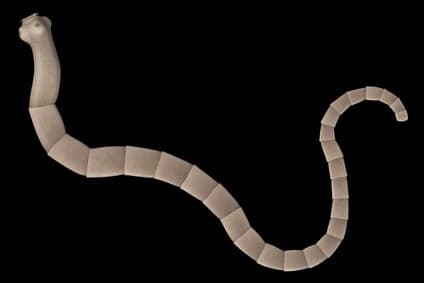
It's fairly rare to see the entire tapeworm in your puppys' stools or vomit because the head of the worm attaches firmly to the inside of the intestines and remains there, while only individual body segments are shed over time. But occasionally a complete worm will be passed.
Sometimes a puppy will show other symptoms of a tapeworm infection, these might include:
- Itching or discomfort around the rectum which causes 'scooting' or repeated licking of the area
- Weight loss
- Poor coat condition
- Lethargy
If a puppy has a severe tapeworm infestation the symptoms can be more obvious, and potentially dangerous:
- Significantly reduced growth rate or anorexia
- Pale gums and lips which indicates anemia (low red blood cell count)
- Belly pain and/or distention which could signal an internal blockage or obstruction by the worms
What do I do if I think my puppy has tapeworms?
If you see any worms or eggs around your puppy's rectum, collect them carefully (while wearing rubber gloves) and seal them in a ziploc baggie so that your vet can see them. This will help with diagnosis.
If you don't see any worms/eggs but are concerned due to other symptoms take your puppy to your veterinarian for a full check up and fecal exam (ie. an examination of a sample of little Rascal's stool under a microscope).
This way your vet will be able to see what type of worms, if any, your puppy has.
Tapeworms aren't as easy to kill as roundworms and require specific deworming medication which your veterinarian can prescribe/administer if there is an infestation.
There are also natural deworming products which can help eliminate puppy worms such as tapeworms and prevent further infestation.
If your puppy is confirmed as having tapeworms it's very important to also treat him for fleas as these two parasites tend to go hand in hand (as it were!).
There are many natural dog flea prevention options which will help you keep little Rascal free of these nasty critters without putting him at risk of the side-effects of chemical-based flea treatments.
Because tapeworms are transmitted by fleas, it's also very important to make sure that you kill off any fleas which may be in your home/yard/puppy's bedding etc.
There are a whole range of puppy deworming medicines designed to do just that.
Some are chemical-based, and there are also safe and effective natural puppy deworming products for mild/moderate worm problems or as worm prevention.
Choose whatever you feel is most likely to be effective, depending on the degree of infestation and your personal preference... but definitely do something to make sure that your environment, as well as your puppy, is flea free.
As well as treating your puppy for roundworms, it's important to try to prevent reinfection and picking up any stools right away is the best way to do this because it prevents the eggs/larvae from re-entering the soil (or your puppy's digestive track if he's a poop-eater!).
Cleaning and sanitizing any areas where your puppy eliminates can also be helpful, but roundworm eggs are notoriously difficult to destroy.
Can tapeworms be passed from puppies to humans?
There are several different types of tapeworms, but the most common one found in puppies and dogs is Dipylidium Caninum which needs the flea to act as host between egg and human, so in order for a person to contract this type of tapeworm they would need to actually ingest a flea.
Now, this isn't impossible, given the size of fleas, the tendency for children to put everything in their mouths, and the fact that if your puppy or environment does have fleas there are probably a LOT of them. But it isn't common for this to happen.
There are other species of tapeworm which use different animals as hosts and these can occasionally cause tapeworm infestation in humans.
The Echinococcus tapeworm are tiny, with only a handful of segments, and they generally prefer sheep and horses as their hosts. Occasionally they will take up residence in people, but this most often happens if someone eats contaminated meat (ie mutton, lamb or horsemeat).
So, tapeworm infestation in humans is rare, but it can happen.
A person can have tapeworm without having any signs of a problem, at least for a period of time.
However as the infestation increases symptoms of tapeworm in humans include:
- Nausea and/or vomiting
- Diarrhea
- Weakness and/or lethargy
- Abdominal pain
- Dizziness
- Weight loss
- Visible worm segments and/or eggs in stools, around anus, or in underwear
In rare cases tapeworm infestation in humans can cause liver cysts and other liver problems.
Your doctor can diagnose a tapeworm problem and prescribe the right medication to clear it up so if you have any concerns, get an examination right away.
Puppy Worms - Hookworms
Unlike roundworms and tapeworms, hookworms are very thin and tiny (averaging about 3mm in length) and are you're unlikely to see them in your puppy's stools.
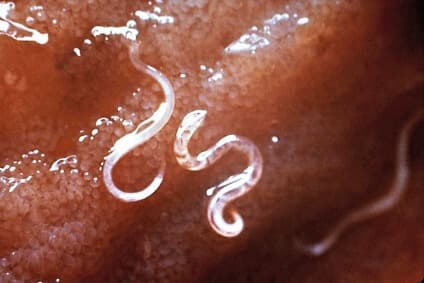
Hookworms can be passed to your puppy in his momma's uterus from her bloodstream through the placenta. They can also be transmitted in her milk when he nurses.
Hookworm eggs thrive in warm, moist areas outdoors (soil/grass/sand) and turn into larvae which can infect your puppy in several other ways:
- If he ingests them while eating soil, grass or plants
- If they pass through the skin (yes, they can do this!) from the ground
- If your puppy eats carcasses of infected animals or insects
- If he eats the stools of infected animals
This type of puppy worms lives up to their name as their mouths are surrounded by tiny hooks which literally 'hook' onto the inside of your puppy's small intestine. Then they just hang there and feed off his blood, indefinitely.
One of the interesting things about hookworms is that most dogs develop a natural resistance to infection by them by the time they're a year old.
How do I know if my puppy has hookworms?
Although hookworms are very small, they are also very dangerous because of the amount of blood they are able to suck out of your puppy over time.
Symptoms of a hookworm infestation are most often the symptoms of anemia or severe blood loss, which include:
- Weight loss
- Bloody diarrhea (due to severe inflammation of intestines)
- Dark, black or 'tarry' looking stools (this indicates blood in the stool)
- Pale gums and lips (low red blood cell count)
- Lethargy or severe weakness
- Skin irritation, especially on paw pads and between toes (due to larvae passing through skin)
- Intermittent cough (in severe infestations worms may migrate to the lungs)
A severe hookworm infestation could kill a youn puppy within a couple of weeks due to the dramatic bloodloss and stress to his system.
What do I do if I think my puppy has hookworms?
Because hookworms are unlikely to be noticeable in little Rascal's stools, having your veterinarian examine a stool sample under a microscope is the best way to get an accurate diagnosis.
Sometimes several samples will need to be examined over a period of three to four days in order to confirm the presence of hookworm eggs.
It's also possible for a puppy to have more than one type of puppy worms at the same time and as not all deworming treatments are able to kill all types of worms, getting the right diagnosis is essential if you want the treatment to be effective.
Most veterinary-prescribed dewormers and natural puppy worming treatments only kill adult hookworms so your puppy will need to have several treatments over a period of weeks in order to make sure all larvae are killed off as they mature.
You will need to have your puppy's stool re-tested after several weeks to make sure that the treatment is effective.
In severe cases where a puppy has become anemic due to extreme blood loss, a veterinarian may need to give the pup a blood transfusion.
Because hookworms are present in soil/sand you also need to treat your yard to kill any larvae and worms which are lying in wait for the next time he (or you) are outside.
It's equally important to pick up your puppy's stools right away so that they don't continue to support the lifecycle of the hookworms by releasing eggs/larvae/worms back into the soil.
Can humans get hookworms?
While hookworms can't be passed from your puppy to the human members of the family, people can be infected by hookworms passing through their skin from contaminated soil/sand, in the same way dogs are.
If your little Rascal is diagnosed with hookworm, chances are good they are in your environment and no-one should be running around outdoors with bare feet... or playing in sandboxes until the old sand is removed, the sandbox sanitized, and new sand added.
Again, it's children who are most at risk of contracting hookworms because they tend to run around barefoot and play in dirt or sand.
If a hookworm enters the human body through the skin it leaves a localized area which is itchy, red or inflamed.
Other than this there are often few symptoms of a mild hookworm problem in humans.
Symptoms of hookworms in humans which is moderate to severe may include:
- Stomach pain
- Diarrhea
- Weight loss
- Loss of appetite
- Fatigue and lethargy
- Anemia
Your doctor can prescribe medication which will kill the whipworms pretty quickly, and in serious cases where anemia is a problem iron supplements might also be given.
Puppy Worms - Whipworms
Whipworms are also fairly small worms, usually up to about 1/4" long. Their bodies are thin at the front end, curled like a whip, and gradually thickens towards the back end.

Like hookworms they attach themselves to the inside of your puppy's digestive tract (in this case the large intestine and colon) and live off his blood.
Whipworm eggs are found in the stools of infected puppies, dogs and other animals. These eggs are very hardy and can survive in soil for several (as many as five) years.
A puppy who eats soil or dirt, or the contaminated stools of other puppies, dogs or animals, is going to be infected.
It's also very possible for a puppy to pick up whipworm eggs on his paws or coat when out running around or playing, and later ingest them when grooming himself.
How do I know if my puppy has whipworms?
Because whipworms behave in a similar way to hookworms, the symptoms of each are fairly alike.
Common symptoms of whipworms in puppies might include:
- Chronic watery/bloody diarrhea
- Weight loss
- Loss of appetite
- Abdominal pain or swelling
- Increase in appetite accompanied by weight loss
- Dehydration
- Lethargy and/or weakness
As with hookworms, a severe whipworm infestation is likely to cause anemia, which can be potentially deadly.
Symptoms of anemia in puppies with whipworms include:
- Pale gums and lips
- Extreme weakness or tiredness
- Collapse
- Difficulty breathing
What do I do if I think my puppy has whipworms?
Whipworms are not seen in stools, and the eggs are too tiny to be seen by the naked eye, so the best way to find out if your little Rascal has them is by making a veterinary visit and having a stool sample analyzed.
Because whipworms don't produce a lot of eggs these aren't shed continually in your puppy's stools. It's more of a intermittent process.
This means that it's perfectly possible for a stool sample to test negative for whipworms even when a puppy has them.
Because of this your veterinarian may test several samples over a period of two or three days to make sure the diagnosis is accurate.
There are several effective puppy deworming medicines for whipworm as well as natural puppy deworming alternatives.
Because hookworms and whipworms can be so deadly for young puppies due to the blood loss they cause, it's advisable to use a medication which is known to be effective when there's an active, or severe, infestation even if you normally prefer natural alternatives.
Once the initial problem is under control turning to natural treatment options should keep little Rascal free from these nasty parasites.
Can humans catch whipworms?
Humans are not a host for whipworms and you can't be infected by any whipworms your puppy may have, or which may be in your environment.
Puppy Worms - Heartworms
Heartworms are parasites which attack your puppy's heart and lungs, rather than his digestive tract.
A heartworm infestation doesn't show any symptoms until it has reached a critical stage and the worms are causing damage to the heart.
The combination of these two things makes heartworm an extremely dangerous condition and one where prevention is much more effective than trying to cure the problem after the fact.
Heartworms are transmitted in the larvae stage by infected mosquitoes.
The larvae then mature as they travel through a puppy's bloodstream and settle in the chambers of his heart, and in his lungs, to grow and mature.
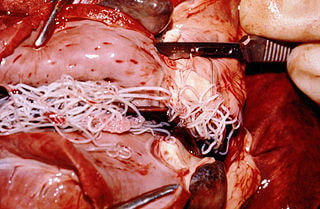
Because it takes around 6 - 7 months for heartworm larvae to reach the stage where they are obstructing bloodflow and causing symptoms, young puppies won't show any signs of heartworm but they do need to be protected against it.
How do I know if my puppy has heartworms?
With heartworms there is no simple fecal test to diagnose the problem, instead your veterinarian will test a blood sample and may also take X-rays, ultrasound scans or do an ECG (aka EKG or electrocardiogram) of your pups' heart.
For the first several months there are no outward signs that your puppy, or dog, has heartworms in his bloodstream, but after around 6 months or so you will start to see that something is seriously wrong.
Symptoms of heartworms in puppies and dogs include:
- Persistent or chronic cough
- Extreme fatigue
- Reluctance or inability to exercise
- Shortness of breath
- Swollen belly (caused by excess fluid buildup due to heart failure)
- Abnormal heart rhythm
- Collapse
- Death
What should I do if I think my puppy has heartworms?
If you notice symptoms in your (older) puppy or dog which you think might be a sign of a heartworm problem it's absolutely vital to get him a veterinary exam right away.
There are effective medicinal treatment options for heartworm (if it's diagnosed in time), but they are long, complicated and difficult for the pup.
The sooner a diagnosis is made and the treatment started, the better his chances of making a full recovery.
Puppy Worms - Lungworms
There are several species of lungworms (which are roundworms, but of a different variety from the roundworms talked about earlier and which target the digestive tract).
Lungworms are round, slender worms which are usually between 1 and 4 cms long. They affect the lungs, and also the trachea, causing a variety of (initially) fairly vague respiratory problems.
As the infestation increases these symptoms can become much more pronounced, and serious.
The way in which lungworms are transmitted varies depending on the individual type of lungworm.
Slugs and snails, and possibly frogs, carry lungworm larvae and if your puppy eats them he will be infected.
If a mouse or other small mammal has eaten an infected slug/snail and little Rascal then eats it, he will be infected.
He could also be infected if he eats the stools of a dog who has lungworm. Foxes can carry a species of lungworm which can be transmitted to dogs through the stools.
Drinking from water contaminated by slugs/snails, wild animal feces and such can also be a source of lungworm infection. This includes puddles, standing water, ponds etc.
With very young puppies, if their momma has lungworm, she can potentially pass it to them through her saliva when grooming or cleaning them, and through her stools if they lick or eat them.
Generally, lungworms can't be transmitted directly from one pup/dog to another, but if they live in the same environment then they're both at risk from the same source of contamination.
However, it is also occasionally possible for some types of lungworm to be transmitted directly from one puppy/dog to another through saliva or nasal discharge.
How will I know if my puppy has lungworms?
The symptoms of a mild lungworm infestation can be very mild, even un-noticeable, especially at first.
They can easily be confused with symptoms of several other conditions and might include generalized lethargy, failure to gain weight, anxious or restless behavior, sneezing and loss of appetite.
As the infestation increases, symptoms become obvious and can be serious, even occasionally deadly.
The most common symptoms of lungworm in dogs and puppies include:
- Vomiting (often contains blood)
- Diarrhea
- Chronic cough (can include hacking and/or gagging)
- Shortness of breath or wheezing
- Exercise intolerance
- Bleeding disorders, internal or external
The respiratory problems can turn into bronchitis or pneumonia. Seizures are also possible in severe cases, as is anemia due to blood loss.
If a lungworm infestation is left untreated there can be damage to the heart, lungs and other organs, and occasionally it can be fatal.
What should I do if I think my puppy has lungworms?
You can't see lungworms because they're not passed in Rascal's feces, and the eggs that are passed are too small to be noticed with the naked eye.
In order to diagnose lungworm in your puppy he needs to be examined by your veterinarian who will do one, or more, of these tests:
- Blood sample analysis
- Baermann stool sample analysis
- Chest X-rays
- Bronchoscopy (examination of trachea and airways)
Diagnosing lungworm can be time consuming and take several different samples and tests to be sure that there are lungworms in your puppy's respiratory system.
Once a diagnosis is made there are several different deworming medications which can be used to treat the infestation and the sooner a diagnosis is made the shorter, and easier, the recovery.
Puppies tend to have more difficulty with a lungworm infestation than adult dogs and the recovery period.
Once a pup/dog has recovered from lungworm he will often have some natural resistance to re-infection.
Can humans catch lungworms from puppies?
No, humans are not at risk from catching lungworms from puppies or dogs, but they can be infected if they eat contaminated snails/frogs or some crustaceans or if there is snail/slug secretions on vegetables or other foodstuffs that haven't been thoroughly washed.
Although it's pretty rare, symptoms of lungworms in humans can include:
- Nausea
- Vomiting
- Fever
- Headache
- Neck stiffness
Puppy Worms... To Sum It All Up
Here are a few bullet points which sum up the information about puppy worms on this page.
- There are several types of worms which can be a danger to your puppy's health
- There are four types of common intestinal worms
- Some worms can be seen in a puppy's stools, some can't
- Minor intestinal worm problems are generally not serious if treated quickly
- If left UNTREATED puppy worms can cause serious health problems, even death
- Heartworms symptoms don't show up until a pup/dog is already very sick
- Prompt treatment is generally quick, easy and effective (except for heartworm treatment)
- Some puppy worms can be passed to, or contracted, by humans
- A veterinary visit is ALWAYS required if you think your puppy has worms
If you want to learn more about other parasites which affect dogs, other animals and humans, you can visit the CDC website HERE.
You Might Also Like:
- Home
- Puppy Worms
